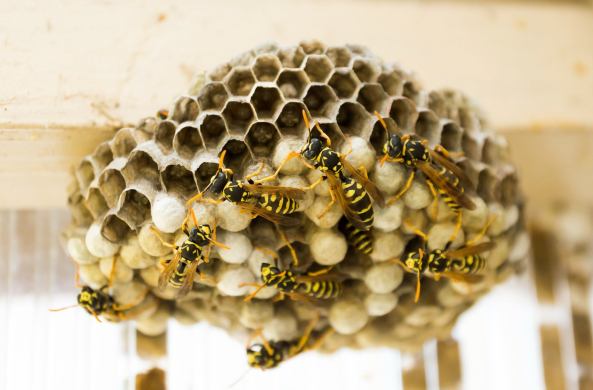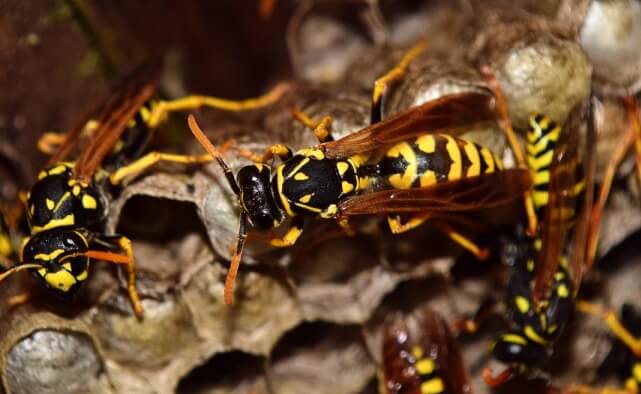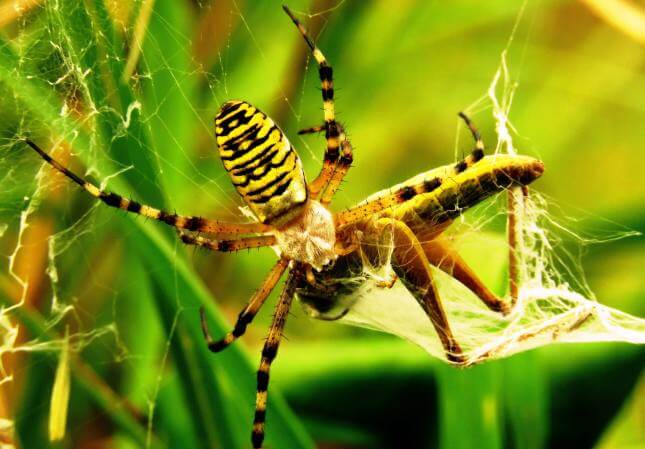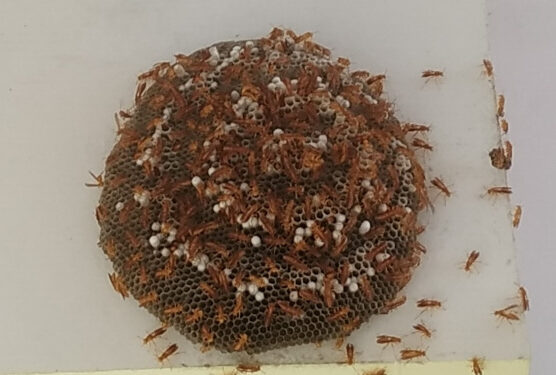Yes, the Mexican honey wasp, also called Brachygastra mellifica, is an exception here. But it produces honey in very small amounts, not as much as a honey bee produces.
My son loves to eat honey on his toast every morning, and while he’s having his breakfast he keeps asking me why an ugly-looking bee keeps hovering around the window outside. Now, I know it’s a wasp but I tell him that it’s a bee thanks to which he got his honey today. It makes him more considerate towards the bees.
Well, my son doesn’t know the difference between a wasp and a bee but adults should. Because bees produce edible honey while wasps generally don’t except for the Mexican honey wasp. But is the honey produced by the Mexican wasp edible at all? Be ready to get all your answers about wasps and hornets here.

Let’s first check which honey is better – wasp honey vs bee honey?
Oh Dear Honey!
Bee honey is not the only honey. There are stingless bees called Meliponini including more than 500 types of bee species that produce excellent honey. These bees are generally found in tropical and subtropical regions of Southeast Asia, Africa, Australia, and America.
The honey they produce differ in taste as well as consistency. The water content is higher, which makes the honey feel consistent and taste tangy. For so many communities across the globe, this type of honey is a crucial source of food and income.
Wasp honey comes from the excess nectar that the Mexican honey wasp creates in their cardboard nests. There are many local indigenous communities that consider wasp honey an important source of income, food, and medicine.
But that’s just about the exception. What about the rest of the species of wasps?
What do wasps do?
Wasps DO NOT make honey. They are smart. They steal honey from the bees!
Yes, wasps steal honey from beehives to feed on larvae or tiny insects.
As far as the Mexican wasp is concerned, they make honey only to be used by themselves. It may make you wonder if wasps are good for anything at all?

Is wasp honey good?
The honey that wasps make is definitely edible. In fact, it’s quite difficult to distinguish between the taste of honey produced by honeybee and wasps.
However, honey produced by the hornets or any other wasp species is not sellable in the market. People consume it for personal uses or don’t use it at all. The only honey that sells is made by honeybees.
Are wasps good for anything?
So far, wasps might not be sounding interesting to you. They sound good for nothing. But that’s not true.
There are some benefits of wasps that justify their existence. They act as natural pest control. This species contributes to the balance of the ecosystem and helps control some plant-feeding pests such as caterpillars and aphids.
We can safely say that wasps are natural predators that help save your crops and plants from pests. Without these wasps, your rooms would be mostly occupied with spiders and other forms of insects. In the United Kingdoms, it was observed that wasps captured an estimated 14 million kgs of insects which majorly included greenflies and caterpillars.
If you have a huge garden or a lawn at the front of your home, you should in fact thank the wasps!
One of the wasp experts at the museum, Dr. Gavin Broad, noted, “wasps are generally apex predators – so if they’re not doing well, it indicates that there is something wrong with the world.” It seems wasps are quite important to the world, unlike popular opinion!
Another reason why wasps are beneficial is that they pollinate. Hopping flowers sucking on their nectar and transferring pollen, wasps are quite helpful in pollination.
Which wasps do you commonly see?
Although there are many other types of wasps that are available in a higher proportion, the only two types you’d see are hornets and yellow jackets.
There are more than 7000 wasps species existing in the U.S. alone including both social and solitary species. The majority of them are parasitoids. Most of these wasps live in man-made nests, which means they could be creating a nest anywhere they’d find themselves comfortable in. So, beware of touching solitary areas nearby your garden or lawns to prevent painful stings from hidden nests of wasps.
What do wasps eat?
It’s interesting to note that most wasp species don’t make honey but in fact, consume nectar from insects and plants as their own food. Common wasps like yellowjackets and bald-faced hornets consume nectar.
Some species of wasps also consume the meat of other insects. Yes, wasps like some meat too! Not barbequed, of course!
Yellowjackets and bald-faced hornets consume different types of insects such as beetles, spiders, caterpillars and grasshoppers. Wasps usually prey on insect species that move slowly.
On the flip side, honeybees and bumblebees often rely on nectar for their food. They also consume insect meat but 80% of their food comes from nectar. Some of the bees also feed on their young ones. The European wasp has been observed to consume grasshoppers as a secondary source of food and nectar as the primary source.

Do you know that wasps also eat pollen?
Yes, wasps not just help in pollination but also consume pollen in their diet. Most types of wasp species, excluding the honey-making Mexican wasp, cannot eat pollen.
However, wasp species like a yellowjacket, bald-faced hornet, and the common wasp can consume pollen when they are sitting on a flower. But once they fly off, the lack of hair on their bodies incapacitates them from carrying the pollen with their bodies. They also lack the ability to pollinate properly due to this reason.

How do wasps eat?
Wasps have really strong jaws and sharp teeth that allow them to chew on insect meat conveniently. They make use of their stringers to prey on insects and then use their jaws to consume them. That’s how they help control the population of different insect species from around the world.
They suck nectar after stealing it from honey bees’ nests and procure their energy from it. A honeybee’s nest is not the only source of nectar for wasps. Those beautiful flowers in your garden are a great source of nectar too! So, if you are a garden owner and want to save your flowers, you might consider taking a look in and around your property. If they’re headed to your garden, they’ll end up extracting all the juice and life out of your flowers!
Wasps also love to consume sugar-made drinks that humans consume such as soda, fruit juice, whole fruits, etc. They also feed on steak or meat and decomposed garbage.
I remember my daughter leaving out an opened can of soda on the lawn one afternoon. When I returned to clean everything up from our little picnic mat, I saw a family of wasps feeding on the soda. To be honest, the soda wasn’t that sugary.
So, from my personal experience, I’d tell you that wasps would go for literally anything that tastes sweet.
We get ample honey from the bees. So, we don’t need to expect the wasps to provide us with more honey. Mainly because wasps have their own tasks to do!
It’s important to understand that, while wasps and hornets might not produce honey or deliver a sweet delicacy to the world, they contribute highly to the ecosystems.
An article published in the Ecological Entomology in 2018 talked about “Why do we love bees and hate wasps?” As one could guess from the title of the article, people tend to hate wasps because they believe wasps to be useless. Whereas people love bees because they give honey. We hope the article changed your mind about that.
Read here: